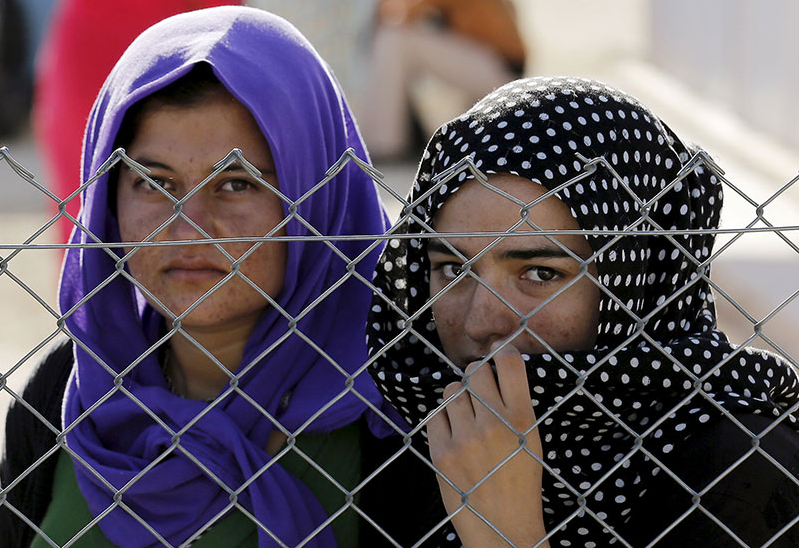
Syrian refugee parents forced to sell their daughters into the sex industry in order to feed their families are asking Christian missionaries to pray they are able to find other means of income, a new report has revealed.
A ministry director working in Turkey recently shared with Christian Aid Mission how one grandmother, named Amena, arrived at one of country's makeshift camps with her daughter-in-law and three grandchildren after her son was sent to fight Islamic State militants.
After months of receiving aid from a ministry based in Turkey, she had enough trust in the group director to tell him how starving refugees feel forced to sell their daughters off to earn money to eat. While Syrian parents typically "fiercely guard their daughters' virtue", many see no option but to get money by handing their daughters over to nightclub owners, she revealed.
"These girls, or newly wedded 'brides,' are then used as slaves - their families don't see them again," the ministry director said. "The refugees are embarrassed about it and don't even admit it's happening to their neighbors, but they ask us to pray for another way to safely earn their money."
Typically a nightclub owner pays $100 after the girls have worked one month.
"But then nothing else comes, and no word about where the girls are being kept is given them," the ministry director said. "We're seeking God's wisdom on how to help them and do appreciate your prayers."
Other children wander away from their tents and are never found: "they might be kidnapped, abused, sold or lost," reports the outlet.
"These refugee mothers are so desperate that they leave their children to find work, hoping to earn enough to rent a place to live," Amena said through a translator. "But the children then get lost and used wrongly."
After leaving their war-torn country, Syrian refugees often experience even more devastation upon arriving in Turkey. In addition to losing their homes, health, friends, and relatives, many are left impoverished. Surrounded by an increasingly hostile Turkish society, the Arabic-speaking refugees struggle to learn Turkish and to find work.
To help combat this, the ministry, supported by CAM, regularly provides food, water, and other items to refugees in nine camps spread across four cities - about 10,000 people.
"The mothers in these camps weep as they plead for baby food, vitamins and clean water, which the ministry teams provide along with infant formula, disposable diapers and milk. The elderly receive medicines, clean water and food tailored to their needs," notes the outlet.
Such assistance softens hearts and draws refugees to Christ, the ministry director shared. He added that "team members are seeing God work miracles" in the refugees' hearts.
"We will be forever thankful for your generosity in allowing us to answer these hurting people," he said. "It's a joy to us to hear them saying, 'Christians are so good, so generous with all the help. It's Christians that care enough to provide our needs when there's no hope.'"
A new study by Save the Children, based on more than 450 interviews with adults and children across the country, reveals that six years of Syrian war have left children with "massive invisible scars."
According to the report, researchers found widespread evidence of 'toxic stress' and mental health issues among children inside Syria. About half of children "say they never or rarely feel safe at school and 40 percent say they don't feel safe to play outside, even right outside their own home.... 78 percent of children feel grief and extreme sadness some or all of the time."
Last month, Turkey opened a 55-house complex in the country's southeastern border town of Reyhanli to shelter and educate nearly 1,000 children orphaned by the civil war, reports UPI.
The 1,000-square-foot complex is the result of a joint project by the Sheikh Thani bin Abdullah al-Thani Foundation for Humanitarian Services, or RAF, and the IHH Humanitarian Relief Foundation.
"Undoubtedly the children are affected most from the Syrian war that has been going on since 2011. One in every three Syrian children, which corresponds to 3.7 million children, was born after the war started," the organizations said in a statement. "Syrian orphans like orphans else where are threatened by substance abuse, forced into being child soldier, human traffickers, missionary organizations, prostitution and organ mafia, begging rings."
"The lives of these children, who were born in the middle of war or far from their homes are shaped up by violence, fear of loss and deportation," the IHH and RAF added. "Psychological support and rehabilitation comes first among the list of essentials needed by orphan children who are war victims in order to grow up as physically and mentally healthy individuals in safe environment."







